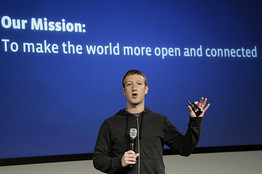 In a tightly watched verdict today, a federal appeals court ruled that “Liking” something on Facebook is indeed a form of speech protected by the First Amendment. According to The Wall Street Journal, the Fourth U.S. Circuit Court of Appeals ruled in favor of a former deputy sheriff in Hampton, Va., who said he was canned for Liking the Facebook Page of the would-be sheriff running against his incumbent boss.
In a tightly watched verdict today, a federal appeals court ruled that “Liking” something on Facebook is indeed a form of speech protected by the First Amendment. According to The Wall Street Journal, the Fourth U.S. Circuit Court of Appeals ruled in favor of a former deputy sheriff in Hampton, Va., who said he was canned for Liking the Facebook Page of the would-be sheriff running against his incumbent boss.
The court said that Liking the other candidate’s Page was the “internet equivalent of displaying a political sign in one’s front yard, which the Supreme Court has held is substantive speech.” The case set a precedent for how the U.S. Constitution will be used to regard our communication on social media.
By ruling in favor of Daniel R. Carter, Jr., the Richmond-based appeals court reversed a previous ruling by federal district judge Raymond A. Jackson. Jackson threw out the plaintiff’s lawsuit last year because he judged that a Facebook Like was “insufficient speech to merit constitutional protection.” While liking your boss’s main foe on social media might not be the best way to build morale in the workplace, it’s certainly within one’s right to do so.
You might be thinking, haven’t courts already ruled in the past that Facebook is a protected form of speech? Yes, Judge Jackson pointed out, except each of those previous cases fell under a separate category because they involved a status update containing “actual statements.”
The ruling today is a landmark reversal by declaring that any statement we make should be considered speech, even if it’s just a Facebook Like.
“On the most basic level, clicking on the Like button literally causes to be published the statement that the User “likes” something, which is itself a substantive statement,” wrote Judge Traxler for the court, based upon a unanimous ruling.
Facebook had also urged the Fourth Circuit Court to reverse Judge Jackson’s ruling. “We are pleased the Court recognized that a Facebook Like is protected by the First Amendment,” Pankaj Venugopal, an associate general counsel at Facebook, said.
Facebook 4th Circuit Appeal Document
Facebook 4 Th Circuit by Joe Palazzolo
Overall, five employees alleged they were fired by the Hampton Sheriff’s Department for Liking another campaign. Even if Sheriff Roberts were to lose the remaining claims, he wouldn’t be required to financially compensate any of the former employees due to a stature under the 11th Amendment, which limits the extent of lawsuits made against public officials. The fired employees would, however, be entitled to receiving their old jobs back.
While the employees being re-hired may be a win for citizens of the internet, what do you think it would be “like” working in that sheriff’s department again?
image via AP


